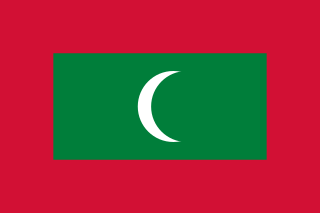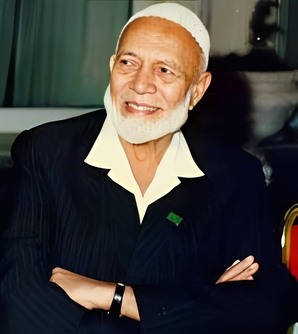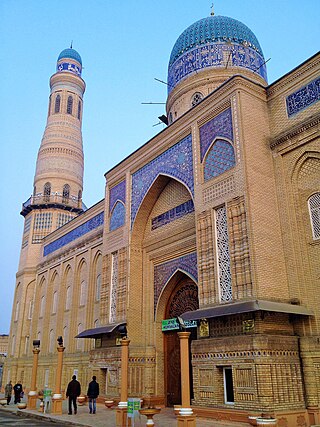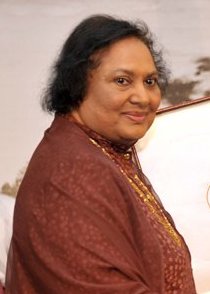Christianity is a minority religion in the Maldives.
In 2013, scholar Felix Wilfred of Oxford University estimated that the number of Christians in Maldives as 1,400 or 0.4% of the country's population. [1]
In 2020, studies found that 0.3% of the population is Christian (roughly split between Catholic and Protestant). [2]
Although the Maldives is quite a liberal country, the Maldives are among the countries with the least tolerance towards Christians. According to the former President Maumoon Abdul Gayoom, no religion other than Islam should be allowed in the Maldives. Public practise of the Christian religion is prohibited.
In the late 1990s, the Supreme Council for Islamic Affairs warned people that they would face arrest if they listened to radio programmes broadcast in the Dhivehi language by the Far East Broadcasting Association, based in the Seychelles. In 1998, 50 Maldivian Christians were arrested and held on the prison island of Dhoonidhoo, and Christian foreigners who were suspected of missionary work were also expelled from the country. [3]
The Church of South India, the Evangelical Mennonite Church and the Seventh-day Adventists are present in this country. [4] Roman Catholics in the Maldives are covered by the Archdiocese of Colombo. The Annals of the Propagation of the Faith mentions that in 1833 after the consecration of Clément Bonnand as the Vicar Apostolic of Pondicherry, he was authorized by the Holy See to send missionaries to the Maldive Islands where the Christian faith has not reached. [5]
Citizens of the Maldives who attempt to convert to Christianity automatically lose their citizenship. President Maumoon Abdul Gayoom stated that the Maldives would be deprived of independence if it is not entirely Muslim. The Maldivian High Commission in Colombo stated in 1998, that reports of persecution are inaccurate and wrong.
According to Open Doors, the country was rated as the 15th worst place in the world to be a Christian. [6]
The arrival of the Portuguese also saw the appearance of Christianity in the region, due to severe torture from the Portuguese for the Maldivians being Muslim, nobody wanted to convert, but they had to survive. In 1558 the Portuguese established a small garrison with a Viador (Viyazoru), or overseer of a factory (trading post) in the Maldives, which they administered from their main colony in Goa. They tried to impose Christianity on the locals and some of the nobility were converted. [7] After a local leader repelled the Portuguese, Christianity receded. The Dutch nominally controlled the region in the mid-17th century then the British in the last years of the 17th century. However, the Dutch and British did not interfere with the religious beliefs of the locals. In the 21st century, Christianity in the Maldives is mainly practiced by tourists and temporary workers.

The Maldives, officially the Republic of Maldives, is a country and archipelagic state in South Asia in the Indian Ocean. The Maldives is named after the main island and capital of Male. The word "Maldives" means "the islands (dives) of Male". The name may derive from the Sanskrit word "maladvipa" meaning "garland of islands". Dhivehi Raajje in Dhivehi means "Kingdom of the Dhivehi people". The Maldives is southwest of Sri Lanka and India, about 750 kilometres from the Asian continent's mainland. The Maldives' chain of 26 atolls stretches across the equator from Ihavandhippolhu Atoll in the north to Addu Atoll in the south.

The history of the Maldives is intertwined with the history of the broader Indian subcontinent and the surrounding regions, comprising the areas of South Asia and Indian Ocean; and the modern nation consisting of 26 natural atolls, comprising 1194 islands. Historically, the Maldives had a strategic importance because of its location on the major marine routes of the Indian Ocean. The Maldives' nearest neighbours are the British Indian Ocean Territory, Sri Lanka and India. The United Kingdom, Sri Lanka and some Indian kingdoms have had cultural and economic ties with the Maldives for centuries. In addition to these countries, Maldivians also traded with Aceh and many other kingdoms in, what is today, Indonesia and Malaysia. The Maldives provided the main source of cowrie shells, then used as a currency throughout Asia and parts of the East African coast. Most probably Maldives were influenced by Kalingas of ancient India who were earliest sea traders to Sri Lanka and the Maldives from India and were responsible for the spread of Buddhism. Stashes of Chinese crockery found buried in various locations in the Maldives also show that there was direct or indirect trade contact between China and the Maldives. In 1411 and 1430, the Chinese admiral Zheng He 鄭和 visited the Maldives. The Chinese also became the first country to establish a diplomatic office in the Maldives, when the Chinese nationalist government based in Taipei opened an embassy in Malé in 1966. This office has since been replaced by the embassy of the People's Republic of China.
The politics of the Maldives take place in the framework of a presidential representative democratic republic, whereby the President is the Head of Government. Executive power is exercised by the government. The President heads the executive branch and appoints the Cabinet; like many presidential democracies, each member of the cabinet need to be approved by the Parliament. The President, along with their pick for vice president, is directly elected by the denizens to a five-year term by a secret ballot. Once in office, they could be re-elected to a second 5-year term, which is the limit allowed by the Constitution. The current President of the Maldives is Mohamed Muizzu, when his predecessor, Ibrahim Mohamed Solih lost the 2023 Maldivian presidential election. Nasheed reportedly resigned involuntarily to forestall an escalation of violence, and was placed in jail, before being forced into exile, from which he eventually returned.

Maumoon Abdul Gayoom is a Islamic Scholar and a Maldivian politician who served as President of the Maldives from 1978 to 2008. After serving as transport minister, he was nominated president by the People's Majlis and succeeded Ibrahim Nasir in 1978. During his tenure the Maldives would become like an autocratic state where freedoms in the capital of Malé were severely repressed and political opponents and protesters arrested. Often being labelled a dictator by other countries. Maumoon's tenure was marked by autocratic absolute rule, reduction in freedoms, increase in state corruption, increase in poverty as well as human rights violations and silencing of political opponents, employing torture, forced confessions, and politically motivated killings.

Ahmed Husein Deedat, was a South African and Indian self-taught Muslim thinker, author, and orator on Comparative Religion. He was best known as a Muslim missionary, who held numerous inter-religious public debates with evangelical Christians, as well as video lectures on Islam, Christianity, and the Bible.
The Constitution of the Maldives is the supreme law of the country of Maldives. It provides the legal foundation for the existence of the Republic of Maldives, sets out the rights and duties of the citizens of the Maldives, and defines the structure of the Government of the Maldives. The current Constitution of the Maldives was ratified by the then president, Maumoon Abdul Gayyoom, on 7 August 2008, and came into effect immediately, replacing and repealing the Constitution of 1998.
The 2005 Maldivian civil unrest refers to the civil unrest that broke out in Malé, Gaafu Dhaalu Atoll and Addu Atoll of the Maldives on August 12, 2005, which led to events that supported the democratic reform of the country. This unrest was provoked by the arrest of Mohamed Nasheed - an open critic of the president Maumoon Abdul Gayoom - and the subsequent demolition of the Dhunfini tent, used by the members of the Maldivian Democratic Party (MDP) for their gatherings. Supporters of MDP were quick to demonstrate. They started calling for the resignation of Maumoon Abdul Gayoom, soon after Nasheed's arrest. Several arrests were made on the first night followed by the demolition of the Dhunfini tent. The demolition complicated the situation further provoking the unrest. The unrest grew violent on the third night, on August 14, 2005, due to the methods used in the attempts by the authority to stop the demonstration.

The President of the Republic of Maldives is the head of state and head of government of the Republic of Maldives and the commander-in-chief of the Maldives National Defence Force.

The Catholic Church in the Maldives part of the worldwide Catholic Church, under the spiritual leadership of the Pope in Rome. The annals of the Propaganda mention that in 1833 after the consecration of Clément Bonnand as the Vicar Apostolic of Pondicherry, he was authorized by the Holy See to send missionaries to the Maldives, where the Christian faith had not reached.

Presidential elections were held in the Maldives on 8 and 23 October 2008, the first democratic elections in the country. As no candidate won a majority in the first round, a runoff was held on 28 October between the two candidates among the contestants who received the most votes, incumbent president Maumoon Abdul Gayoom and Mohamed Nasheed, who received the second most votes after Gayoom in the first round. Nasheed was elected to the office after winning a majority in the runoff, unseating incumbent president Gayoom who held the office for six terms, lasting three decades.

Christianity in Asia has its roots in the very inception of Christianity, which originated from the life and teachings of Jesus in 1st-century Roman Judea. Christianity then spread through the missionary work of his apostles, first in the Levant and taking roots in the major cities such as Jerusalem and Antioch. According to tradition, further eastward expansion occurred via the preaching of Thomas the Apostle, who established Christianity in the Parthian Empire (Iran) and India. The very First Ecumenical Council was held in the city of Nicaea in Asia Minor (325). The first nations to adopt Christianity as a state religion were Armenia in 301 and Georgia in 327. By the 4th century, Christianity became the dominant religion in all Asian provinces of the Eastern Roman Empire.
The 2008 Constitution of Maldives designates Sunni Islam as the state religion. Only Sunni Muslims are allowed to hold citizenship in the country and citizens may practice Sunni Islam only. Non-Muslim citizens of other nations can practice their faith only in private and are barred from evangelizing or propagating their faith. All residents are required to teach their children the Muslim faith. The president, ministers, parliamentarians, and chiefs of the atolls are required to be Sunni Muslims. Government regulations are based on Islamic law. Only certified Muslim scholars can give fatawa.

The vice president of the Republic of Maldives is the second-highest official in the executive branch of the government of the Maldives, after the president of the Maldives, and ranks first in the presidential line of succession. The vice president is directly elected together with the president to a five-year term of office.

Maldives–Pakistan relations are the foreign relations between Pakistan and the Maldives.

Islam is the predominant religion in Uzbekistan.

The Ministry of Islamic Affairs is a government agency of the Republic of Maldives, handling the country's religious affairs. It was previously known as Supreme Council for Islamic Affairs, and was constituted by the president of Maldives, Maumoon Abdul Gayoom in 1996. The institution was renamed in November 2008, by the president of the Maldives, Mohamed Nasheed. The Ministry of Islamic Affairs' mandate is established by Constitution of Maldives.
Human rights in the Maldives, an archipelagic nation of 417,000 people off the coast of the Indian Subcontinent, is a contentious issue. In its 2011 Freedom in the World report, Freedom House declared the Maldives "Partly Free", claiming a reform process which had made headway in 2009 and 2010 had stalled. The United States Bureau of Democracy, Human Rights and Labor claims in their 2012 report on human rights practices in the country that the most significant problems are corruption, lack of religious freedom, and abuse and unequal treatment of women.

The High Commission of the Maldives in London is the diplomatic mission of the Maldives in the United Kingdom.

Abdulla Yameen Abdul Gayoom is a Maldivian politician who served as president of the Maldives from 2013 to 2018.

Moomina Haleem Ahmed Ismail is a Maldivian former politician. In 1974 she became the first woman to be elected to the People's Majlis. Three years later she also became the first woman appointed as a cabinet minister.
{{cite book}}: CS1 maint: multiple names: authors list (link)